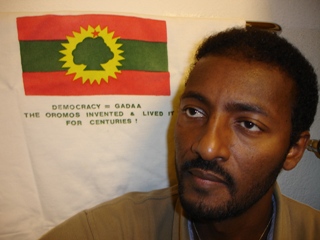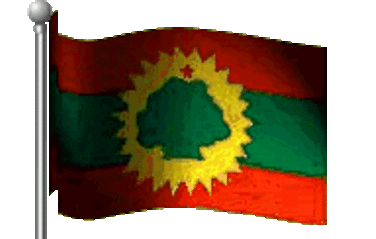Human Rights in Ethiopia: Through the Eyes of the Oromo Diaspora

Report
A 96-page report documents the human rights violations against the Oromo people in Ethiopia under three successive regimes.
The Advocates for Human Rights’ report, Human Rights in Ethiopia: Through the Eyes of the Oromo Diaspora, documents the experiences in Ethiopia of members of the Oromo diaspora throughout three successive political regimes. The long arm of human rights violations reaches directly into diaspora communities, including the Oromo, who reported a widespread belief that e-mail communication to Ethiopia is read by the Ethiopian government, that telephone conversations are overheard, and that the Ethiopian government monitors the activities of diaspora members in the United States. Oromos interviewed for the report also described decades of human rights violations in Ethiopia, including arbitrary arrest, incommunicado detention, torture, and extra-judicial executions. Reports of widespread surveillance and interference with rights to freedom of association, assembly, expression, conscience, and the press were pervasive. Oromos reported that the current Ethiopian government’s federal system has served to isolate ethnic communities, including the Oromo, leaving them even more vulnerable to human rights violations.
EXECUTIVE SUMMARY
The history of Ethiopia is steeped in human rights abuses by the government against its people, including members of the Oromo and other ethnic groups. Ethiopian regimes, from the Abyssinian empire to the present, have sought to consolidate power by repressing the political and cultural activities of the Oromo people and that of the many other ethnic groups which make up Ethiopia’s population. The Abyssinian empire, backed by European arms, sought to colonize the territory traditionally held by the Oromo and other ethnic minorities. The Marxist Derg, which seized control from Emperor Haile Selassie in 1974, was dominated by Mengistu Hailemariam. Mengistu ruthlessly eliminated rivals, consolidated power, and erected a state security apparatus that continues to be used today.
The current Ethiopian government, which came to power in 1991, is no exception. The Ethiopian People’s Revolutionary Democratic Front (“EPRDF”), dominated by members of the Tigray People’s Liberation Front (“TPLF”), moved quickly to identify and eliminate its rivals. It called for its most likely challenger, the Oromo Liberation Front (“OLF”), to participate in a new coalition government. The EPRDF’s move not only allowed it to appear open to political power-sharing in the regime’s early days, it brought the OLF leadership and members into the open. By 1993, when the OLF finally split with the EPRDF, OLF leadership and members had been identified. By the end of 1993, the EPRDF had arrested approximately 20,000 suspected OLF members, driven most OLF leadership into exile, and effectively neutralized the OLF as a political force in Ethiopia.
The Ethiopian government has built on its predecessor’s infrastructure of repression. Torture of dissidents by the current regime, including extreme physical violence and psychological torture, was reported by those interviewed for this report. Sexual violence also was reported. In addition, extrajudicial killings, arbitrary arrests, prolonged detention, and confinement in inadequate prison conditions reportedly have continued under the EPRDF. Basic protections of due process, including notice of charges against those accused, are absent, and the judiciary faces pressure from the government.
The state surveillance apparatus erected under the Derg continues to result in restrictions on Ethiopians’ rights to freedom of association, privacy, movement, and property. Alleged ties to the OLF may serve as justification for arrest, detention, firing, expulsion, or confiscation of property. The government continues to monitor Ethiopians and conduct surveillance through the neighborhood associations, or kebeles, that were established by the Derg and served as the local apparatus of state security. A perception that all communications by phone, post, or email are monitored by the government is nearly universal. New restrictions have been placed on foreign funding of non-governmental organizations. Press restrictions and intimidation of the press continues. Elections held in 2005 and 2008 were marred by violence and intimidation.
The EPRDF’s main political strategy has been that of ethnic federalism as a means of amassing control. This policy has provided a veneer of autonomy to Ethiopia’s ethnic groups while eroding those groups’ political power and potential for challenging the EPRDF and further consolidating state power. The policy of ethnic federalism has had a negative impact on the basic economic, social, and cultural rights of Ethiopians.
The government’s tactics have extended to the educational system, where Oromo teachers and students face harassment and intimidation on suspicion of association with the OLF. Reports of monitoring, termination, or arrest of Oromo teachers and students were common. The mandatory use of the Oromo language in schools, reversing the decades old policy prohibiting instruction in any language other than Amharic, has not apparently lessened government suspicion that people who speak or write in the Oromo language support the OLF. The requirement of instruction in Oromo has also reportedly led to a decrease in educational opportunities for Oromo students, who are now at a disadvantage in the higher education system where Amharic or English is required.
Another impact of the Ethiopian government’s ethnic federalism policies has been the relocation of Oromo farmers. A belief that the relocation programs have economically benefited Tigray and Amhara people to the detriment of the Oromo was reported. The forced relocation has also placed resources in the Oromo region under strain, resulting in denial of rights to adequate shelter, water, food, and health care.
As Ethiopia moves toward national elections in 2010, the people of Ethiopia have the opportunity to hold the government accountable for its human rights record in Ethiopia. At the same time, the Government of Ethiopia has the opportunity to demonstrate its commitment to ending decades of human rights violations and respecting its obligations to uphold international human rights standards.
Recommendations
• The Government of Ethiopia should immediately cease the use of torture in its prisons, kebele offices, and other places of detention.
• The Government of Ethiopia should ensure that all persons detained by the Government are immediately brought before a competent and independent judicial authority to determine the lawfulness of their detention.
• The Government of Ethiopia should respect the right of all persons to assemble and to associate with others, and to ensure that all persons have the ability to meaningfully participate in the electoral process. The Government should take particular care to ensure that these rights are respected during the lead up to the elections in 2010.
• The Government of Ethiopia should ensure that all persons in Ethiopia, regardless of their ethnicity, have equal access to educational opportunities.
• The Government of the United States should ensure that military and other aid to the Government of Ethiopia is not used to support repression of ethnic groups or political opponents
Read more


